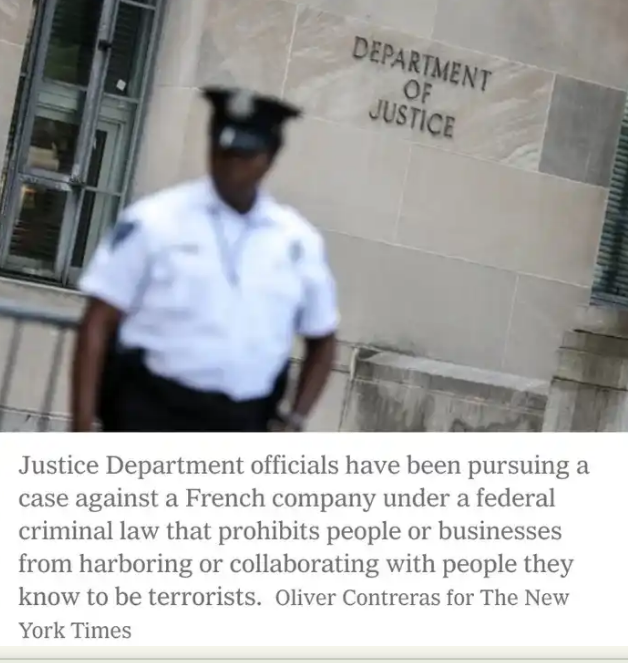
The Justice Department has reached a $777.8 million criminal plea agreement with a French cement company that paid off the Islamic State terrorist group in order to continue operating in Syria in 2013 and 2014 — at a time when the group was abducting and murdering journalists and aid workers.
Executives with Lafarge, which is based in Paris, agreed to the deal after paying nearly $17 million payments to ISIS to Islamic State leaders and urging them to help the company keep its production facilities running, according to a company spokesman and law enforcement official.
The agreement with Lafarge, a subsidiary of the Switzerland-based Holcim Group with expansive operations in the United States, is by far the largest settlement paid by a private company charged with providing material support to a terrorist organization. The company pleaded guilty in federal court in Brooklyn on Tuesday to a single count of conspiracy to provide material support to a foreign terrorist organization.
The company’s lawyers have argued in French courts that the Lafarge’s efforts were not intended to assist the Islamic State but to ensure its operations continued.
Justice Department officials had been quietly pursuing their own case against the company under a federal criminal law that prohibits people or businesses from harboring or collaborating with people they know to be terrorists.
The investigation that led to Lafarge and its defunct Syrian subsidiary being indicted in U.S. District Court in Brooklyn, New York, to one count of conspiring to provide material support to a designated foreign terrorist organization, is ongoing. No individuals have been charged.
The company said in a statement that the conduct that set off the case has ended.
“None of the conduct involved Lafarge operations or employees in the United States and none of the executives who were involved in the conduct are with Lafarge or any affiliated entities today,” the company said, adding that it had “accepted responsibility for the actions of the individual executives involved, whose behavior was in flagrant violation of Lafarge’s Code of Conduct.”
Lafarge said it “continues to cooperate fully with the French authorities in their investigation of the conduct and will defend itself against any judicial actions that it regards as unjustified in the French proceedings.”
“We deeply regret that this conduct occurred and have worked with the U.S. Department of Justice to resolve this matter,” Lafarge said.
Lafarge was purchased by Switzerland-based Holcim in 2015.
Holcim in a statement to CNBC said it supports the plea agreement that Lafarge reached with DOJ.
“None of the conduct involved Holcim, which has never operated in Syria, or any Lafarge operations or employees in the United States, and it is in stark contrast with everything that Holcim stands for,” Holcim said in that statement.
“The DOJ noted that former Lafarge SA and [Lafarge Cement Syria] executives involved in the conduct concealed it from Holcim before and after Holcim acquired Lafarge SA, as well as from external auditors,” Holcim said.
Holcim said in its statement that the DOJ has determined that it is not necessary to appoint an independent compliance monitor for Lafarge because Holcim has effective compliance and risk management controls to detect potential similar conduct.
Lafarge was indicted by French authorities in 2018 in connection with the ISIS payments on charges of being complicit in crimes against humanity.
Lafarge, which was founded in the middle of the 19th century during the construction boom in Paris, frantically worked to keep its Syrian operations functioning even as Islamic State forces cut a swath of destruction through the region.
While other multinational companies pulled out, Lafarge made a calculated decision to stay, pushing the limits of international law to keep going. The company’s actions, reconstructed by The New York Times in 2018 from sealed French court filings, documented the efforts of executives to take a series of actions — trade-offs and payments — that left one of the world’s biggest construction materials firm vulnerable to criminal and legal jeopardy in the United States and France.
To move supplies and employees through dangerous areas, and to secure raw materials, Lafarge funneled money to intermediaries who negotiated with the Islamic State, as well as Al Qaeda’s affiliate in Syria and other armed factions, according to the documents, which include testimony to investigators by former Lafarge officials, testimony and witness accounts of former employees, company correspondence and a confidential internal review of Lafarge’s Syria operations by the global law firm Baker McKenzie.
The only other settlement comparable to the Lafarge deal was the 2007 agreement between the Justice Department and Chiquita Brands International Inc., which admitted to paying off a violent, right-wing terrorist organization known as the United Self-Defense Forces of Colombia to keep its operations running.










